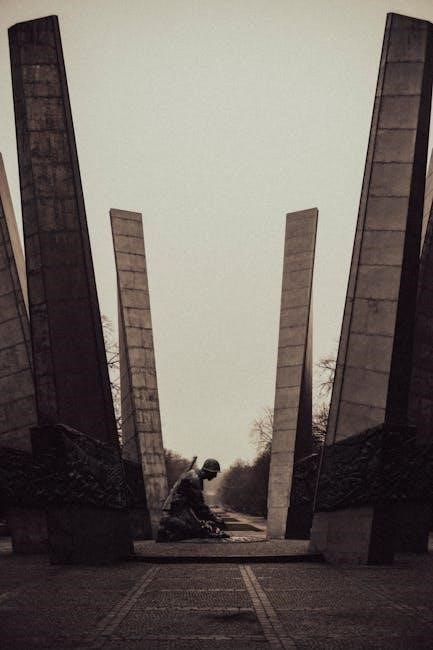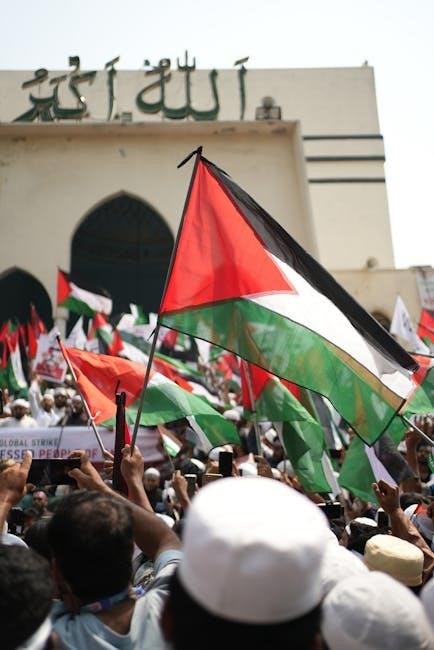
the hundred years’ war on palestine pdf
Rashid Khalidi’s book offers a powerful narrative of a century-long conflict, blending historical analysis with personal archives to illuminate the Palestinian struggle against settler colonialism.
Overview of Rashid Khalidi’s Book
Rashid Khalidi’s The Hundred Years War on Palestine is a landmark history tracing the Israeli-Palestinian conflict from 1917 to 2017. Drawing on archival materials and family records, Khalidi examines the colonial nature of Zionism and Palestinian resistance. The book intertwines historical analysis with personal narratives, offering a unique perspective on the struggle. It challenges common narratives, emphasizing the centrality of settler colonialism and the dispossession of Palestinians. Khalidi’s work is both a scholarly account and a deeply personal exploration, providing a comprehensive understanding of the conflict’s roots and evolution.
Significance of the Book in Understanding the Israeli-Palestinian Conflict
Khalidi’s book is vital for understanding the Israeli-Palestinian conflict, offering a fresh perspective by framing it as a century-long colonial war. It highlights the role of external powers and the resilience of Palestinian resistance. By integrating personal and historical narratives, the book humanizes the conflict, making it accessible and emotionally resonant. Its meticulous research and balanced approach provide a nuanced understanding, essential for scholars and general readers seeking to grasp the conflict’s complexities and ongoing impact.

Historical Roots of the Conflict
The conflict’s origins trace back to early 20th-century colonial ambitions, with Britain and the U.S. shaping its trajectory, leading to ongoing displacement and resistance.
The 1948 Arab-Israeli War and Its Impact on Palestinians
The 1948 Arab-Israeli War marked a pivotal moment, leading to the displacement of hundreds of thousands of Palestinians, known as the Nakba or “catastrophe” in Arabic. This event resulted in the destruction of villages, loss of livelihoods, and the creation of a long-lasting refugee crisis. The war not only reshaped the geopolitical landscape but also entrenched a legacy of dispossession and resistance. Its impact remains central to the Palestinian experience, symbolizing the ongoing struggle for justice and self-determination.
Key Phases of the Conflict: 1917-2017
The conflict unfolds across distinct phases, from the 1917 Balfour Declaration to the 2017 diplomatic shifts. Each phase reflects evolving strategies of settler colonialism and Palestinian resistance. The British Mandate era, 1948 war, 1967 occupation, and ongoing struggles up to 2017 highlight persistent themes of displacement, occupation, and resilience. Khalidi’s analysis captures the dynamic interplay of local and global forces shaping this protracted struggle, offering a comprehensive view of a century of conflict and its enduring consequences.

Settler Colonialism and Resistance
Rashid Khalidi’s work frames the conflict as settler colonialism, highlighting mechanisms of displacement, occupation, and resistance. It examines how external powers have shaped Palestine’s struggle for sovereignty;
Colonial Nature of the Conflict
The Hundred Years War on Palestine reveals the colonial underpinnings of the conflict, tracing the displacement of Palestinians through Zionist expansion and British imperial policies. Khalidi argues that settler colonialism, supported by global powers, has systematically erased Palestinian identity and sovereignty. The book highlights how colonial practices, such as land confiscation and forced migration, have persisted into modern times. By examining archival records and personal histories, Khalidi exposes the mechanisms of colonial domination and resistance, offering a nuanced understanding of Palestine’s ongoing struggle for liberation and justice.
Resistance Movements and Their Evolution
Palestinian resistance has evolved through diverse phases, from early revolts against British rule to modern grassroots movements. Khalidi documents how resistance shifted from armed struggle to nonviolent protests and diplomatic efforts. The book highlights key figures and movements, illustrating how Palestinians adapted their strategies to counter colonial oppression. By exploring archival materials, Khalidi reveals the resilience and creativity of Palestinian resistance, emphasizing its role in preserving national identity and striving for justice in the face of ongoing dispossession and occupation.

International Involvement
The book underscores the pivotal role of global powers, particularly Britain and the U.S., in shaping the conflict, highlighting how their policies supported Zionist aspirations and impacted Palestinian rights.
Role of Britain and the United States
Britain’s 1917 Balfour Declaration and subsequent Mandate laid the groundwork for Zionist expansion, while U.S. diplomatic and military support solidified Israel’s position, marginalizing Palestinian aspirations and rights.
Impact of Global Politics on the Conflict
Global powers have shaped the Israeli-Palestinian conflict through political alliances and interventions. Britain’s colonial policies and the U.S.’s unwavering support for Israel have significantly influenced the conflict’s trajectory. International bodies like the UN have played dual roles, sometimes mediating but often failing to enforce resolutions. The Cold War further complicated the situation, as superpowers exploited regional tensions. Today, global politics continue to sway the conflict, with shifting alliances and geopolitical interests impacting efforts toward peace and justice for Palestinians.
Personal and Family Perspectives
Rashid Khalidi’s family archives and personal accounts provide intimate insights into the Palestinian experience, weaving intergenerational struggles and resilience into the broader historical narrative of dispossession and resistance.
Rashid Khalidi’s Family Archives and Their Contribution to the Narrative
Rashid Khalidi’s family archives, including letters, diaries, and historical records, provide a unique lens to understand the Palestinian experience. Drawing from his ancestors, who served as mayors, judges, and diplomats, Khalidi weaves personal stories into the broader historical context. These archives illuminate the daily struggles and resilience of Palestinians, offering a deeply personal and authentic perspective on the conflict. By integrating these materials, Khalidi humanizes the narrative, revealing the emotional and social fabric of a people under colonial rule and dispossession.
Personal Accounts of Displacement and Struggle
Khalidi’s work vividly captures personal accounts of displacement and resilience, detailing the human cost of the conflict. Through stories of his family and others, he portrays the emotional toll of forced migration and the enduring spirit of resistance. These narratives highlight the personal and collective struggles of Palestinians, offering a poignant reminder of the conflict’s impact on individuals and communities. By sharing these accounts, Khalidi ensures that the voices of those affected are heard and remembered.
The Hundred Years War on Palestine is a landmark history of a century of conflict, settler colonialism, and resistance, reflecting on its ongoing impact and future prospects.
A Century of War and Its Ongoing Consequences
Rashid Khalidi’s book reveals the profound impact of a century-long conflict, rooted in settler colonialism, which has shaped the Palestinian experience through displacement, occupation, and resistance. The 1948 Arab-Israeli War marked a pivotal moment, leading to the displacement of hundreds of thousands of Palestinians, an event known as the Nakba. This legacy continues to influence contemporary realities, with ongoing human rights violations and political instability. The book underscores the urgent need for accountability and justice to address the ongoing consequences of this protracted struggle.
Future Prospects for Peace and Justice
Achieving peace and justice requires acknowledging the historical injustices faced by Palestinians and addressing the root causes of the conflict. International accountability, recognition of Palestinian rights, and a commitment to self-determination are essential. Grassroots movements and diplomacy must align to challenge oppressive systems and promote equality. Only through a framework of justice and equity can a lasting resolution be envisioned, ensuring dignity and security for all parties involved in the century-long struggle.

Accessing the Book
Where to Find “The Hundred Years War on Palestine” in PDF Format
The book is available in PDF format on various platforms, including official publishers and academic databases, ensuring easy access for readers worldwide.
The book is widely available in PDF format on major online retailers like Amazon and Barnes & Noble. Academic databases such as JSTOR and ResearchGate also offer access. Additionally, platforms like the Internet Archive provide free downloads, though some may require user accounts. Purchasing directly from the publisher ensures the most reliable access. Always verify the source for authenticity to avoid unauthorized or incomplete versions of the text.